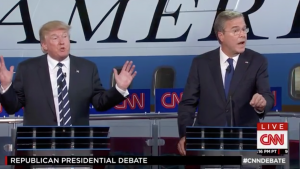 Election season is here and presidential debates are taking center stage as millions tune in to watch candidates vie for the nation’s top spot. With all eyes on the candidates, little attention is paid to the behind-the-scenes jockeying that determines crucial details, like when the debates are held, how many there will be, and who gets to participate.
Election season is here and presidential debates are taking center stage as millions tune in to watch candidates vie for the nation’s top spot. With all eyes on the candidates, little attention is paid to the behind-the-scenes jockeying that determines crucial details, like when the debates are held, how many there will be, and who gets to participate.
During the primary season, the two major parties craft their own guidelines.
Tight Time for Dems
On the Democratic side, the Democratic National Committee has faced sharp criticism from within for holding its debates late in the season (the first is scheduled for Oct. 13) and limiting their overall number to six, only four of which will take place before the Iowa caucuses in February. That stands in contrast to last election when Democrats held 26 debates and forums. If a Democratic candidate participates in a non-sanctioned debate, the DNC will ban them from the official debates.
Martin O’Malley, the former Md. governor and presidential hopeful, called the DNC debates “rigged” and said they were scheduled to benefit the frontrunner, former Secretary of State Hillary Clinton. “Four debates, and four debates only, we are told – not asked – before voters in our earliest states make their decision. This is totally unprecedented in our party’s history,” O’Malley said at a DNC event last month.
O’Malley’s claim of DNC gamesmanship is bolstered by the times selected for the DNC debates. Of the four DNC debates with assigned dates, three take place on the weekend, when viewership tends to be lower. This contrasts with the GOP debates; of the eight with assigned dates, six take place on weeknights.
O’Malley’s criticism of the DNC is echoed by another Democratic candidate, Sen. Bernie Sanders, who is considering debating Republicans in the primary season despite the DNC ban on outside debates. Joining Sanders’ and O’Malley’s call for more debates is an increasingly large chorus of voices, including House Democratic leader Nancy Pelosi and ex-DNC delegate Peter Burling who said barring candidates who participate in outside debates “must seem [to Bernie Sanders] like a pair of handcuffs custom crafted to control his behavior.” Nevertheless, the DNC is sticking to its schedule.
Conservative Chaperones
While Democratic presidential candidates have yet to square off, tens of millions have tuned in to the Republican debates to watch Donald Trump take on a large but winnowing GOP field. The most recent debate drew 23.1 million viewers, making it the most watched CNN program ever. Directly preceding it, 6.3 million viewers watched the “JV” debate for candidates who didn’t meet the Republican National Committee/CNN requirements for the primetime debate (which may have been massaged to accommodate certain candidates).
This year, the RNC established a chaperone system to ensure news organizations presenting the debates provide “a conservative element.” For the most recent debate, the RNC-required partner for CNN was Salem Media Group, a conservative radio network. This partnered CNN’s moderators, Jake Tapper and Dana Bash, with conservative radio host Hugh Hewitt. The only network that won’t be on the “chaperone system” is Fox News. “As a news operation, we were not comfortable with relinquishing any level of control over the editorial process of the debate,” said a Fox News executive.
This isn’t the RNC’s first attempt to use its control over the high-rating debates to make demands of TV networks. In 2013, the RNC voted unanimously to bar CNN and NBC from hosting Republican presidential debates unless the networks dropped TV projects about Hillary Clinton, which the networks subsequently did, although they said it was unrelated to the RNC’s request.
Two Parties Only
After the primaries are completed, it’s on to the general election debates, which are run by the Commission on Presidential Debates. (CPD released dates and locations this week for the three 2016 presidential debates, and one vice-presidential debate). While official-sounding, CPD is a private organization jointly created in 1987 by the two major parties, with the DNC and RNC heads serving as the first co-chairs. (Then-RNC chair Frank Fahrenkopf is still serving as CPD co-chair.) Shortly after its creation, CPD seized control of the televised presidential debates from the independent League of Women Voters, which hosted the debates for decades.
The League was known to give serious consideration to minor party candidate participation in the televised presidential debates, angering both the DNC and RNC. In response to being pushed out, the League called the debates “a fraud on the American voter” and said in a press release, “It has become clear to us that the candidates’ organizations aim to add debates to their list of campaign-trail charades devoid of substance, spontaneity and honest answers to tough questions.”
To win the presidency, the televised presidential debates, which reach into tens of millions of homes, play a crucial role. Yet these all-important civic exercises are controlled by the two major parties – separately in the primary debates, jointly in the general election debates. How they structure – or rig – the debates skews the democratic process.

